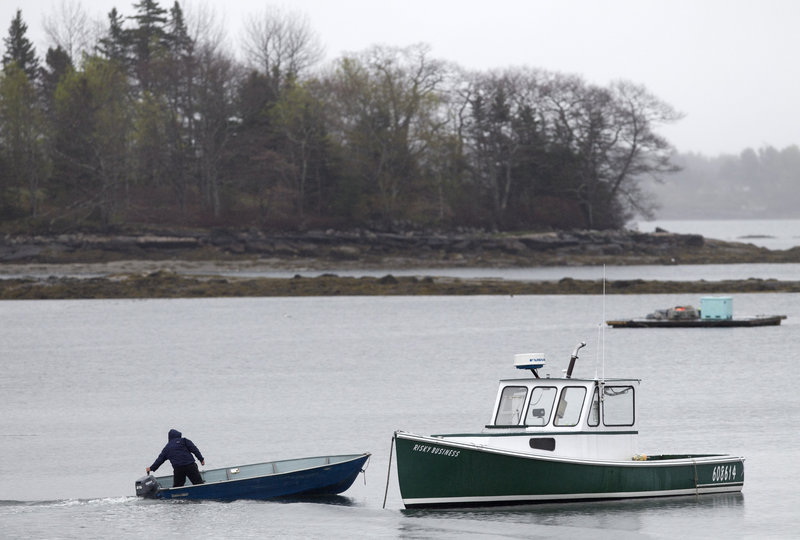STANDISH – In recent years, carbon dioxide gas has received a lot of attention.
The biggest source of CO2 comes from fossil fuel combustion, which contributes more than 13 trillion pounds to the atmosphere annually. CO2 traps heat, and so this increase in atmospheric CO2 is the reason that Earth’s average temperature is warming.
If this warming trend continues, average temperatures will continue to rise at least an additional 2 to 8 degrees in the next 90 years, and Maine’s climate will be similar to that of Maryland and Virginia. Those 100-plus-degree days of last summer will one day not look so bad.
Unfortunately, scientists now recognize that a warming planet is only one consequence of our addiction to fossil fuel energy and all the CO2 that it produces when burned.
Because CO2 dissolves readily in water, nearly 25 percent of what is released to the atmosphere each year is absorbed by the world’s oceans.
For decades, scientists assumed that humankind had benefited from this “oceanic” CO2 absorption, and indeed we have, as warming on land has undoubtedly been slowed as a result. However, we now know that you can’t dissolve nearly 21 million metric tons of excess CO2 into the ocean each day and not have some radical chemical changes.
It is now universally recognized throughout the oceanographic community that the absorption of all this CO2 by the ocean (550 billion tons and counting) has resulted in a decrease in pH and changes in seawater chemistry, a phenomenon that collectively is referred to as “ocean acidification.”
When CO2 dissolves in water, it produces carbonic acid. From the Pacific waters of Hawaii, to the Atlantic waters of Bermuda and the Canary Islands, to the Arctic waters of Antarctica, humans have lowered the pH of the ocean by 0.1 units in the last 100 years.
While such a decrease may seem small, the way pH is measured means that this change actually represents a 30 percent increase in acidity. Without targeted reduction in CO2 emissions soon, the acid content of the ocean will increase by more than 300 percent in the next 50 to 75 years.
The increase in seawater CO2 and the corresponding decrease in pH are occurring at a rate not experienced in the ocean for at least 60 million years. The ocean as we know it will change drastically — and indeed, it already is changing.
Microscopic animals known as pteropods, food for young salmon and whales alike, are dissolving in cold-water regions of the ocean. Experiments show that small lobsters have significant loss of shell strength when exposed to acidified seawater, making them more vulnerable to predators.
Coral reefs are literally dissolving and will likely not survive past 2100. In areas of the Pacific Northwest, shellfish hatcheries are failing and there has not been a natural set of oysters in years because of corrosive seawater. Although ocean acidification has been recognized for about a decade, there are hundreds of peer-reviewed publications showing the deleterious effects on flora and fauna of the sea.
The state of Maine is as tightly coupled to the sea as any place on Earth. The shellfish industry alone generates more than $50 million annually and employs approximately 3,000 harvesters and dealers. In 2011, Maine lobster landings exceeded 100 million pounds, valued at more than $330 million.
Still, the effects of ocean acidification are starting to be seen in Maine. From corrosive seawater to acidic mud, Maine is experiencing the early signs of acidification. Access to an ocean capable of sustaining healthy seafood populations is critical for Maine families and is necessary to preserve the rich heritage and coupled history that Mainers have with the ocean.
Maine residents need to support the efforts of the Environmental Protection Agency to limit carbon emissions from new power plants. The EPA’s recently announced New Source Performance Standard will limit CO2 emissions from newly constructed power plants. These standards are critical to addressing climate change and saving the oceans.
Ocean acidification is an undisputed fact that cannot be ignored and is a powerful reason to reduce CO2 emissions, especially here in Maine. Therefore, I urge Maine’s congressional delegation to support the EPA’s new carbon rule and not to support attempts to delay or block it in Congress.
Mark Green is a professor of marine science at Saint Joseph’s College in Standish.
Copy the Story Link
Send questions/comments to the editors.



Success. Please wait for the page to reload. If the page does not reload within 5 seconds, please refresh the page.
Enter your email and password to access comments.
Hi, to comment on stories you must . This profile is in addition to your subscription and website login.
Already have a commenting profile? .
Invalid username/password.
Please check your email to confirm and complete your registration.
Only subscribers are eligible to post comments. Please subscribe or login first for digital access. Here’s why.
Use the form below to reset your password. When you've submitted your account email, we will send an email with a reset code.